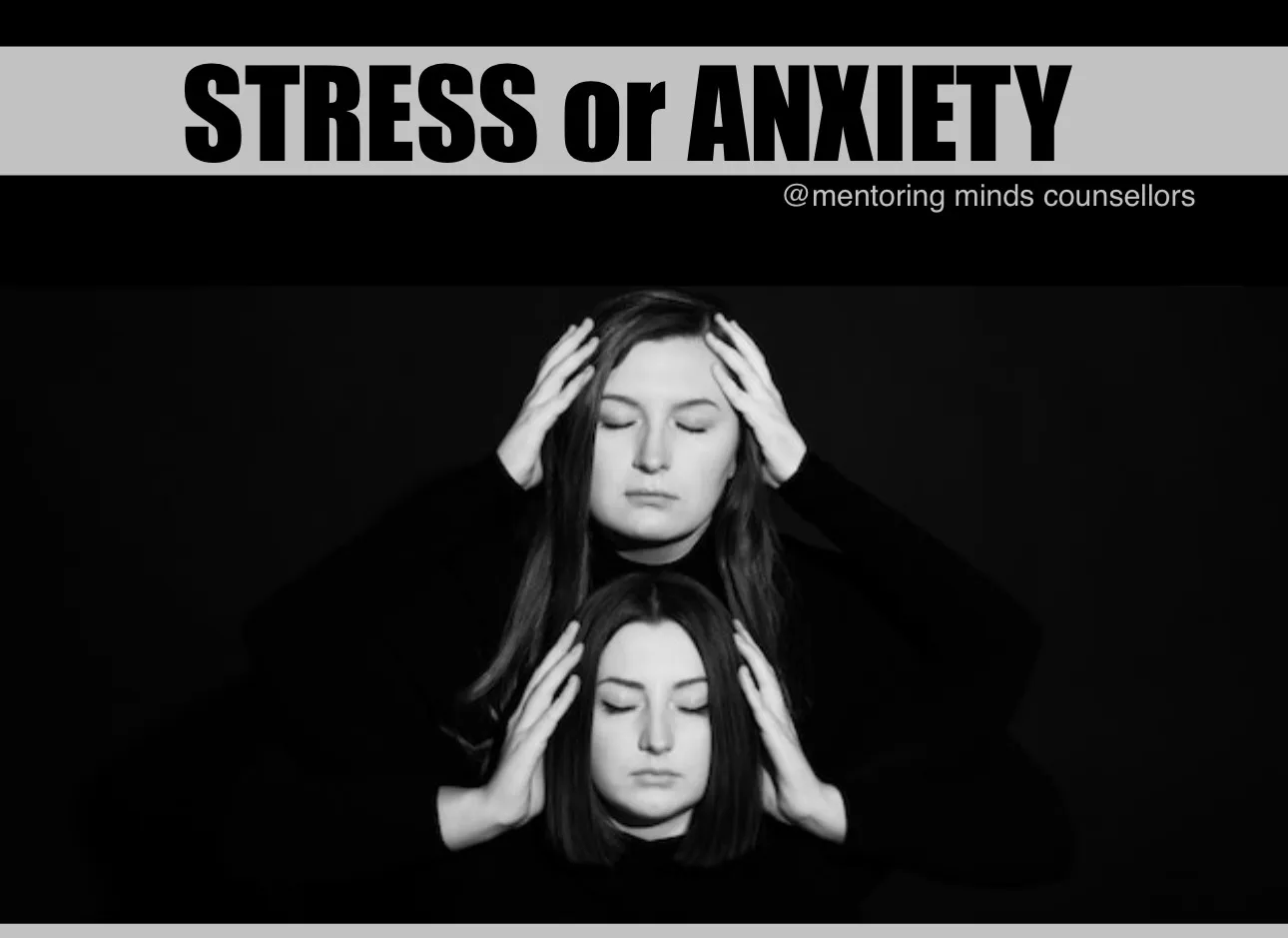In today’s world it’s easy to feel overwhelmed. Whether it’s the constant juggling of responsibilities at work, maintaining relationships, or navigating personal challenges, we often find ourselves under pressure. But, how do we distinguish between stress and anxiety?
What is Stress?
Stress is a natural response to external pressures or demands often referred to as “stressors.” It’s our body’s way of reacting to situations that require action. Think of it as your body’s engine revving up when it senses a challenge or a threat.
What can be some of the Common Stress Triggers?
- Tight deadlines at work
- Family obligations or conflicts
- Financial issues
- Major lifestyle changes
Physical Symptoms:
- Increased heart rate
- Headaches
- Muscle tension or back pain
- Digestive issues
- Sleep disturbances
Emotional Reactions:
- Irritability
- Frustration
- Feeling overwhelmed or “burned out”
- Difficulty concentrating
In a nutshell: Stress is usually caused by an external factor, and it tends to fade away once the source of stress is resolved or managed.
What is Anxiety?
Anxiety, on the other hand, is more of an internal experience. It’s a feeling of unease, worry, or fear that doesn’t necessarily come from an identifiable external event. People with anxiety often experience heightened feelings of dread, often without a clear cause or the ability to escape it.
While anxiety can stem from stressors, it’s typically more intense, persistent, and disproportionate to the actual situation at hand. It’s often characterized by anticipatory fear the worry about things that might happen in the future.
What can be some of the Common Anxiety Triggers?
- Fear of the unknown or the future
- Social situations
- Personal health concerns
- Unresolved past trauma
It shall go through the Physical Symptoms of:
- Restlessness or constant nervousness
- Heart palpitations or a racing heartbeat
- Shortness of breath
- Sweating
- Nausea
- Dizziness or feeling faint
It shall go through the Emotional Reactions of:
- Overthinking and catastrophizing situations
- An overwhelming sense of fear or dread
- Avoidance of certain situations (like social events)
- Feeling “on edge” even when there’s no immediate threat
In a nutshell: Anxiety doesn’t always have an immediate cause, and it can persist even in the absence of an obvious stressor. It’s like a constant low-level storm in your mind.
What can be the Key Differences Between Stress and Anxiety:
- The Cause:
- Stress is often the result of external factors or pressures, like work or personal responsibilities.
- Anxiety can arise without an identifiable cause, making it more unpredictable.
- The Duration:
- Stress usually dissipates once the source of stress is resolved or managed. For instance, once you finish a big project or meet a deadline, your stress levels often drop.
- Anxiety can persist long after a trigger is gone. Even when the situation has been resolved, anxiety may continue to linger.
- The Intensity:
- Stress can cause temporary discomfort, but it usually remains proportional to the situation.
- Anxiety is often disproportionate to the event and can feel overwhelming and intense, even when there’s no immediate danger.
- The Symptom:
- Both stress and anxiety can have similar physical symptoms like rapid heartbeat, muscle tension, and difficulty sleeping, but anxiety tends to have a more constant or recurring presence.
- The Effect:
- Stress tends to focus on specific tasks or problems that can be solved or managed.
- Anxiety, however, often involves excessive worry about things that might not even happen, leading to a pattern of overthinking and constant fear of potential outcomes.
When Stress Becomes Anxiety?
Stress and anxiety often go hand-in-hand, and sometimes, chronic stress can lead to anxiety. If you find that the physical and emotional toll of stress persists for weeks or months, it might develop into generalized anxiety.
For example, a person who’s constantly stressed about work deadlines might eventually start to worry excessively about their career, even when there’s no immediate threat. This is when the line between stress and anxiety becomes blurred.
When to Seek Help?
If you’re finding it difficult to manage stress or anxiety, or if these feelings are interfering with your day-to-day life, it might be time to seek help from a mental health professional. Therapy can provide you with the tools to better understand your emotions, and a doctor can help guide you through options like medication if needed.
Final Thoughts
We at Mentoring Minds Counsellors understand that Stress and Anxiety may share some overlapping symptoms, but they are distinct experiences. Recognizing the difference between the two is the first step toward understanding your mental health and finding effective ways to manage your emotional well-being. Whether it’s through practical strategies to handle stress or professional help for anxiety, remember that you don’t have to face it alone. It’s okay to seek support, and it’s okay to take the time you need to care for your mental health.


Leave a Comment